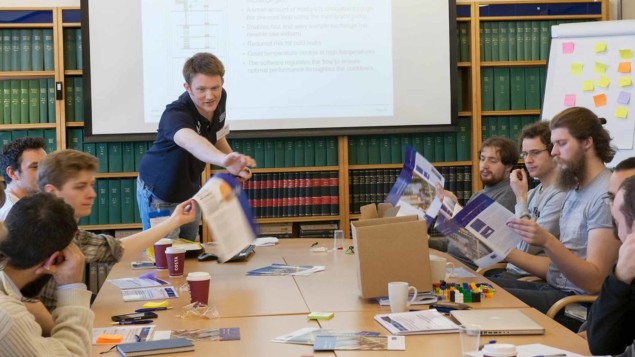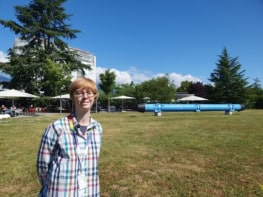Five years after the creation of a multi-institution graduate school for physics PhD students, Peter McDonald and James West outline the lessons learned

The role of a PhD programme is to train students for a career in research – be it at university or in industry. In our experience, almost all physics students who begin a PhD hope for an academic career, yet the overwhelming majority eventually move into industry where they contribute hugely to the research and development of firms. Although this picture seems to be accepted by those now embarking on a PhD, many students still have little idea how they could exploit their physics PhD beyond the narrow confines of their research project.
In 2008 – a difficult time for UK physics, which suffered funding cuts and department closures – nine university departments in the south east of England came together to form the South East Physics network (SEPnet). This collaboration helped revive physics in the region by focusing on outreach as well as student employability via a summer industry placement scheme. In 2013 SEPnet launched GRADnet to give PhD physics students greater awareness of opportunities outside academia and a broader set of the skills that are needed to exploit them.
Thriving school
Over the past five years, GRADnet has developed into a thriving graduate school offering around 30 days of bespoke training every year to more than 450 physics PhD students. There is only a handful of multi-institution, discipline-specific graduate schools in the UK but GRADnet is one of the largest, offering a mix of short workshops, web-based resources, residential schools and student-led conferences. The workshops cover topics such as research data management, entrepreneurship, intellectual property, outreach, preparing fellowship applications and advanced programming. One especially popular option is an introduction to publishing offered by a team from IOP Publishing, which publishes Physics World.
The online materials cover a wide range of topics, from explanations of theory to job-hunting, and have been prepared by students in their later years usually in response to “I’d wish I had known that earlier”. Pedagogic schools cover advanced physics topics such as cosmology in a friendly environment that helps develop collaborations. However, our flagship and most popular annual event is the four-day summer school “What next”, which explores job opportunities through employer-led workshops and challenges. The summer school is complemented by a winter school that focuses on leadership.
Creating GRADnet has been a steep learning curve and some elements have worked better than others. Two years after GRADnet was formed, we radically revised how we deliver material, if not our aims. We had initially carried out training via video conference, which had proved successful for established groups within SEPnet. Yet for GRADnet this was not a good way to bring new groups together. It required one- or two-hour time slots that broke up the day and it was too easy for students – and indeed staff – not to attend. Moreover, although we had state-of-art technology, it was not robust enough for a good learning experience.
We learned instead that three- or four-day schools work best. They disrupt timetables less, promote networking and give students the time and space to explore new ideas. For staff, schools can efficiently offer more varied teaching methods including interactive and hands-on sessions. So while each school has a predominant theme, for example experimental methods, it also covers many other aspects, such as writing skills in the guise of preparing a beam-time proposal.
Another issue for us has been intellectual property rights, which has plagued widespread open dissemination of our online materials. Indeed, the general problems of a multi-institution website – SEPnet is not a legal entity in its own right – with materials behind a login became so much that we have all but abandoned everything online that cannot be publicly open. Unfortunately, this means that some created materials have been lost. Others, however, can now be found on YouTube.
GRADnet was an experiment: could we deliver bespoke, discipline-specific, multi-institution researcher training? Our answer is yes – with more than two-thirds of PhD students in the region actively engaged. From July 2018, SEPnet and GRADnet have no longer received dedicated public funding, with financial support instead coming from its partners’ own resources. Employers, who find GRADnet an efficient and beneficial way to engage with students, now contribute about 30% of GRADnet teaching. This is hugely welcomed and appreciated. Indeed, GRADnet could not have succeeded without the invaluable support from more than 30 employers, such as Oxford Instruments.
Academic opposition
Yet the near universal support of employers is not always matched by PhD supervisors. It is unfortunate that some academics still regard broad researcher training as a distraction and an inconvenience. The worst even discourage students from attending.
GRADnet has already enabled some partners to establish a collaborative Centre for Doctoral Training in Data Science. These centres recognize that doctoral training is changing – no longer are students asked only to carry out their supervisor’s research. We believe that student-focused training should not be solely fixed on academia. If GRADnet is to continue to grow, it needs to shout this message even clearer to those that have not yet heard it.



